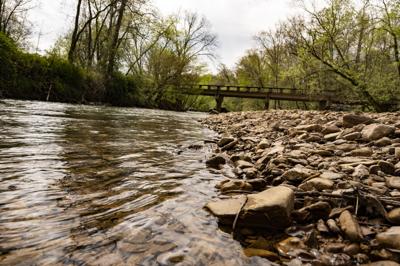
Trace Creek
Believe it or not, according to one Nashville environmental scientist, reusable straws probably aren’t going to be the thing that solves global warming.
When it comes to environmentalism, there’s a wide range of personal philosophies. There are the “recycling is king” people. There are the bike people. There are even the occasional “chain myself to a tree/refuse to move for a bulldozer” environmental activists. And as a larger portion of the public begins to accept climate change as a reality, more people are becoming conscious of their impact on the environment. But over the past decade, a new challenger has entered the ring.
“Gen Z is kind of fed up with being like, ‘We can make a change,’” says Carley Carder, an environmental scientist who works in stream restoration. “There’s just no way. There’s no way we can make a change like that.”
Carder cites a 2017 study, which found that 100 companies are responsible for 71 percent of global carbon emissions since 1988. While a significant portion of that number comes from consumers burning the fuel supplied by oil corporations, naturally, this led many people, especially among the “Don’t blame me, I just got here” generation, to question just how impactful a tube of natural deodorant can really be. Columns, debate panels and lengthy Instagram posts ensued. (TikTok hadn’t come to the States yet.)
But as hard as people worked to spread the message that maybe we should be doing more to put pressure on corporations to stop killing the environment, corporations’ PR experts worked harder. ExxonMobil, the fifth-highest carbon emitter in the world, kicked off an ad campaign centering on everything they were doing to be green. BP, number 11 on the list, encouraged people to know their own carbon footprint and how to reduce it. Though Amazon wasn’t on that 2017 list, Jeff Bezos’ corporation is the biggest polluter of the so-called “Big Five” tech companies; last year, Amazon allowed users to tell Alexa to “grow a tree,” which would send a dollar from the user’s Amazon Pay account to the global reforestation nonprofit onetreeplanted.org.
Pressuring these corporations to engage in real, substantial change requires a massive, organized movement. Many members of Gen Z have taken to calling any form of environmentalism that doesn’t directly target global-level polluters performative.
“There’s a part of me that doesn’t want to say that,” says Carder. “I want it to be true, that people can make a change [on an individual level]. That feels good. But maybe that’s a part of the problem, is that I just want to feel good about it.”
“Don’t litter, keeping water clean,” she says. “I think we can make a difference in that, but when it comes to this conversation surrounding climate change, it’s a whole different ball game.”
Picking up trash, conserving water, and biking or walking when possible are all things that individuals can do to improve the environment of their communities. These individual actions will look different depending on the community you live in. Carder points to rural communities, where biking isn’t really possible, and gas-guzzling vehicles are more often a part of life. In coastal cities, she notes, avoiding single-use straws could actually make more of a difference.
If you’re thinking about climate change, individual-level actions like these are really just a drop in the bucket. But they can, according to Carder, be an important step toward developing the passion for the environment that people need in order to organize and create bigger change.
“I think people getting outside is another important thing,” she adds. “If you get outside and you start to love it, then you will appreciate [the environment]. I think that’s important. I grew up in a really rural area, and so you’re outside all the time. But in Nashville I think the opportunities to get outside are a lot harder.”
Along with improving our immediate environments, Carder says it’s time to start applying pressure up top.
“I think governmental regulation is the answer — go out and vote,” she says. “You also vote with your dollars. So make sure you’re spending money in places that really care about this kind of stuff. If enough people stop buying stuff from Amazon every day, then that will send the message.
Exploring environmental activism, water quality, living alongside urban wildlife and more






